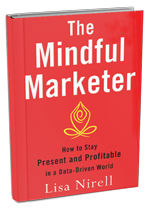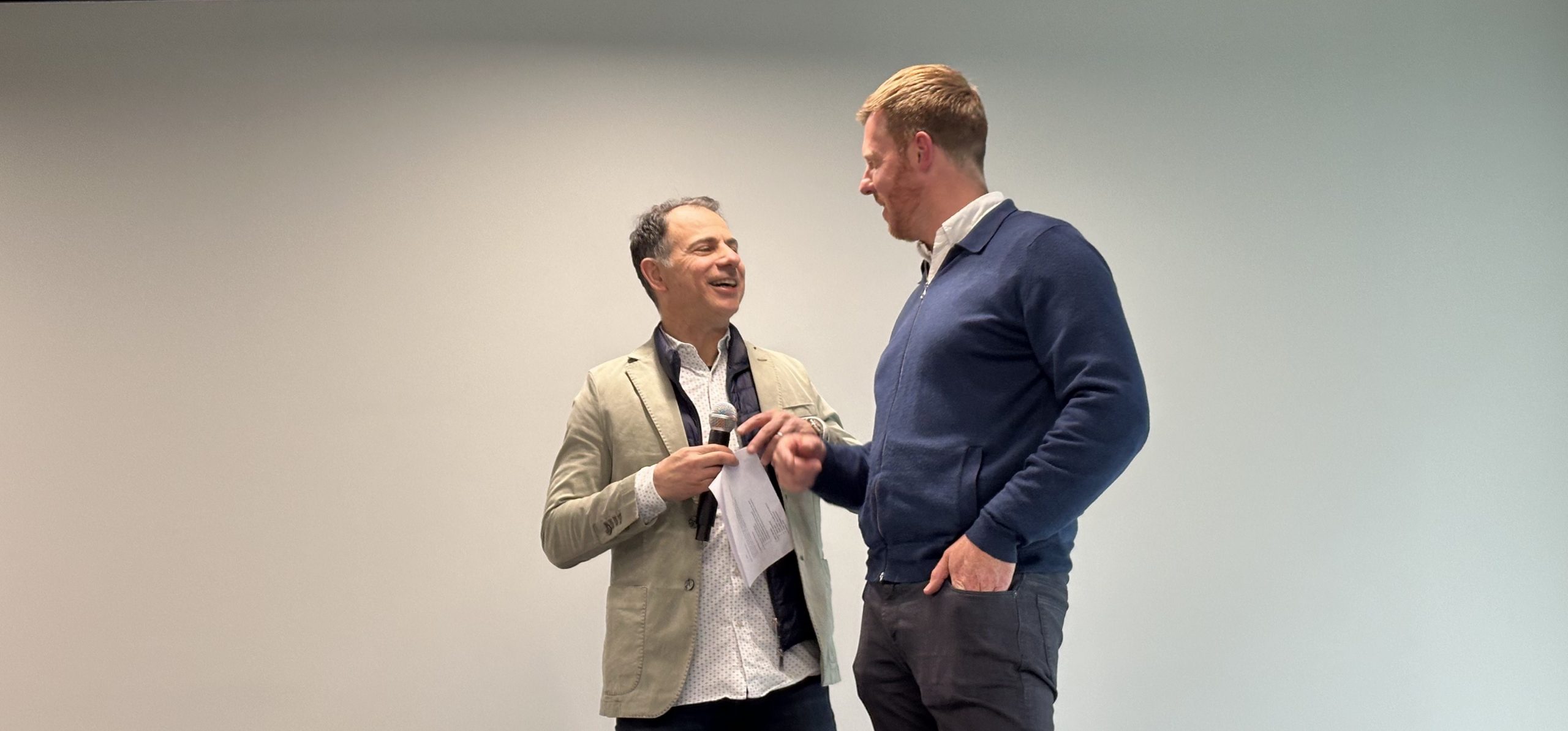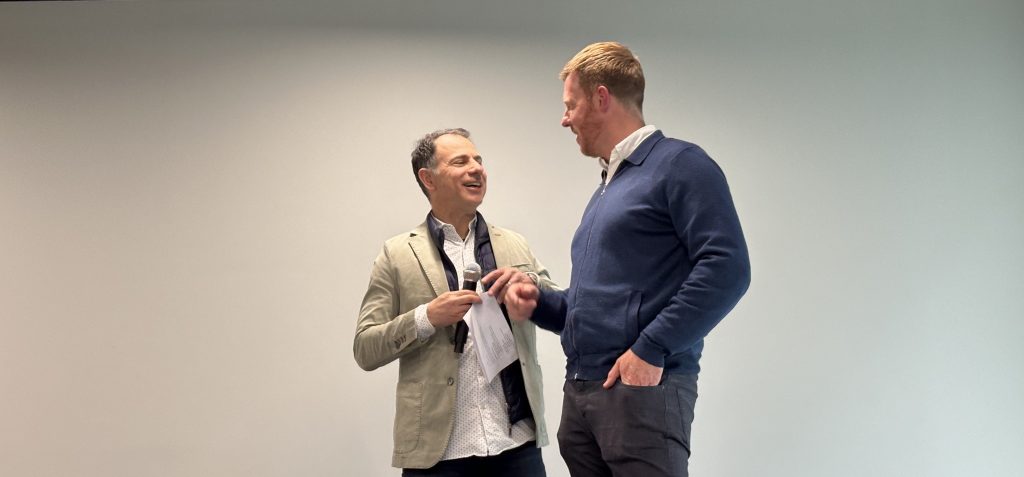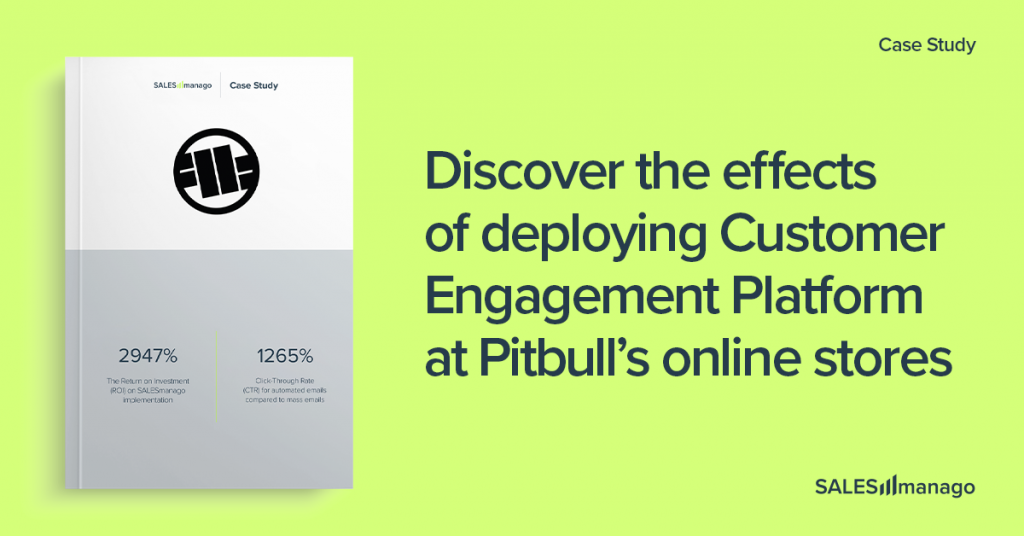Feeling lost in your mailbox and in your newsfeed? Constantly alarmed by omnipresent “asap”? Frustrated with lack of common language with CEO and CIO? In short breaks between endless tasks, you ask yourself: wasn’t my work supposed to be about something else? About communication, building relationships, creativity?
If that’s your story, take a look at Lisa Nirell’s book The Mindful Marketer: How to Stay Present and Profitable in a Data-Driven World, which helps find purpose and focus in marketing again. Today Lisa shares with us some of her ideas and practical tips.
Do you believe that marketer’s job is different from others?
I’ve had the pleasure of working with some of the top CMOs and marketers across the U.S. Their jobs are changing more rapidly than many others, thanks to two dynamics: new buyer behaviors (especially online), and the explosion of mobile technology. They are required to adapt to these new digital realities and to 24 x 7 customer demands. At the same time, they are stewards their company’s brand to the best of their ability. It’s a herculean effort.
One might say that business and mindfulness don’t go along. In your book you argue otherwise: that ability to self-reflect allows marketers to fight distractions, focus on crucial tasks, plan and communicate effectively.
Marketing leaders have the option to spend their time in 3 areas: fixing yesterday’s chronic issues; daily decision-making and email inbox management; and designing the future. While many marketing executives may have strategic titles such as “CMO” or “VP of Marketing,” they struggle to make time for the latter. This relegates them to “order taker” mode—a perpetual McDonald’s drive-through window for the rest of the organization.
Mindfulness practices are a gateway towards becoming a market-maker, a fearless and effective communicator, and a visionary.
For you creating marketing plan is crucial. Why is it so important and why many companies operate (sometimes even well) without it?
Our brains depend on it. Did you know that if you do not build a written plan, your internal filing system cannot prioritize? Neuroscientists have discovered a part of our brain called the Reticular Activation System (RAS). Written goals and plans help us separate the urgent from the important.
Some companies can skate through a few months—even a year—without a written marketing plan. I have a client who survived their first 18 years without one. The consequences were costly. They experienced high attrition of their top engineers, low trust in the executive team, and eroding investor confidence. When they developed a solid, concise growth plan, they were able to restore confidence, return to positive cash flow within a year, and secure additional funding.
It’s only a matter of time until they reach a certain growth plateau and problems can surface. Things can get worse if they miss financial targets. And when the water is low, the rocks appear.
How should marketers become more adept and thriving in the world of information overload? There are so many books, blogs, podcasts… Do you have your secret formula for finding valuable ones?
Overload is a choice. It’s our responsibility to know when it’s time to turn off our email, social media feeds, and just allow our brains to process information. There is a fine line between being informed and inundated.
I encourage my CMO clients to subscribe to blogs and publications that inspire them to think globally and creatively, and to put themselves in their customers’ shoes. I also believe we need to minimize negative media feeds. How will watching a 1 hour documentary on terrorism, for example, improve our lives?
My favorite publications and blogs are places where my clients publish and gather: Alexis Madrigal’s “5 Interesting Things” daily newsletter is a pithy blend of technology, art, and innovation; FastCompany features the latest entrepreneurs and design trends; Forbes has its finger on the pulse of business growth and marketing. I also love reading Shambhala Sun, Simple, The Wall Street Journal, and anything Guy Kawasaki writes.
You write a lot about CMO’s problems with finding common language with CEOs, CFOs and CIOs. Could you share some tips on how to do that or what is vital for mutual understanding?
Absolutely. First, marketers need to understand the most common causes of unnecessary tension between marketing and C-suite executives who are responsible for profit and loss.
Today, this is especially important because most Marketing budgets are growing at a healthy pace. When compared to the past few years, they are also supporting an increasing number of strategic programs. Yet expanded authority does not give marketing leaders license to fly at unsafe speeds or altitudes. Strategic, mindful leaders need to anticipate what obstacles they may encounter in their flight path. Here are three they need to anticipate:
- Under-estimating potential turf battles. In one instance, one chief marketing officer (CMO) confidentially told me that “keeping our customer data base current is very important, but it is currently owned by several departments. No single person is accountable; it’s a committee effort. Nobody feels they have enough resources to manage it.” Imagine how many weeks of productive, meaningful customer face time were forever lost due to turf battles!
- Lack of clear attribution. Some companies lack clear metrics attribution, especially between Sales and Marketing. Double-dipping can occur when sales and marketing report the results from a given campaign. Sometimes it is difficult to know what caused the customer to buy: the ad, the social media campaign, or the salesperson.
- Short-term mindsets on the true value of Marketing persist. Obsession with weekly sales and comparisons of revenues over time and lead conversion rates can cause this short term myopia. Mindful marketers take a more holistic approach to planning and measurement. They consider future income streams such as brand repute and value, the value of inventory, and the quality of the customers they are attracting.
In my book, I provide several new definitions and models that will not only expand your view on the value you create for your organization. They will also show you how other marketing leaders are creating greater impact on their company’s revenue and brand repute.
What would you recommend to marketers who would like to start being more focused and less distracted? Where to begin?
While many experts encourage marketers to do more, I suggest you need to be more. This can be accomplished by pausing, observing, and creating time to regain your balance. This approach may feel counterintuitive to many marketers. In these competitive times where the customer demands 24 x 7 support, it is very tempting to focus on filling our calendar to pacify our stakeholders.
I believe we need to find our Inner Marketing Guru (IMG). It’s our inner guide that reminds us to pay attention—to be mindful—and to live our lives from one moment to the next without judging or evaluating.
Consider these four habits:
- Establish a practice for paying attention. Three minutes a day, stop and ask “What’s different from yesterday? How has my work/customers/team changed since then?” It refines your high noticing skills and forces you to live in the present moment.
- Be curious and practice investigation. This is the ability to understand and observe the true nature of all things. It’s your reality check to help you see things as they really are. When you assume you already know what customers want, or truly believe you can change another person’s behavior, you are probably inflicting unnecessary suffering on yourself and others.
- Manage your energy levels several times daily. Your energy levels define the fuel you need to persistently act. For marketers, this translates into maintaining the will and persistence to carry out your initiatives and goals, even when you feel discouraged. When I work with clients, I pay special attention to my members’ energy levels, their propensity to take action, and how they nourish themselves intellectually, physically, spiritually, and nutritionally.
- Strive for tranquility. This occurs when we are able to attain calming of the body and calming of the mind. Every work environment should include a quiet, technology-free workspace to help us achieve this. Google, Target, and the Huffington Post offer employees meditation rooms. Employees can use these spaces to nap, meditate, and unplug from the hectic work pace.
Lisa Nirell, the Chief Energy Officer of EnergizeGrowth®, helps companies grow mind share and market share. Since 1983, Lisa has worked with Infor, Bozzuto, Zappos, BMC Software, Adobe, Microsoft, and hundreds of entrepreneurs in nine countries. Lisa is also an award-winning expert speaker and author.






 Follow
Follow


![[New Feature] Shine the light on your hidden visitors with Spotlight](https://blog.salesmanago.com/wp-content/uploads/2024/04/1-9.png)


![[New Feature] Unlock Deep Behavioral Personalization with Product Collections](https://blog.salesmanago.com/wp-content/uploads/2024/03/1-3.png)



![[New Feature] Shine the light on your hidden visitors with Spotlight](https://blog.salesmanago.com/wp-content/uploads/2024/04/1-9-1024x536.png)







